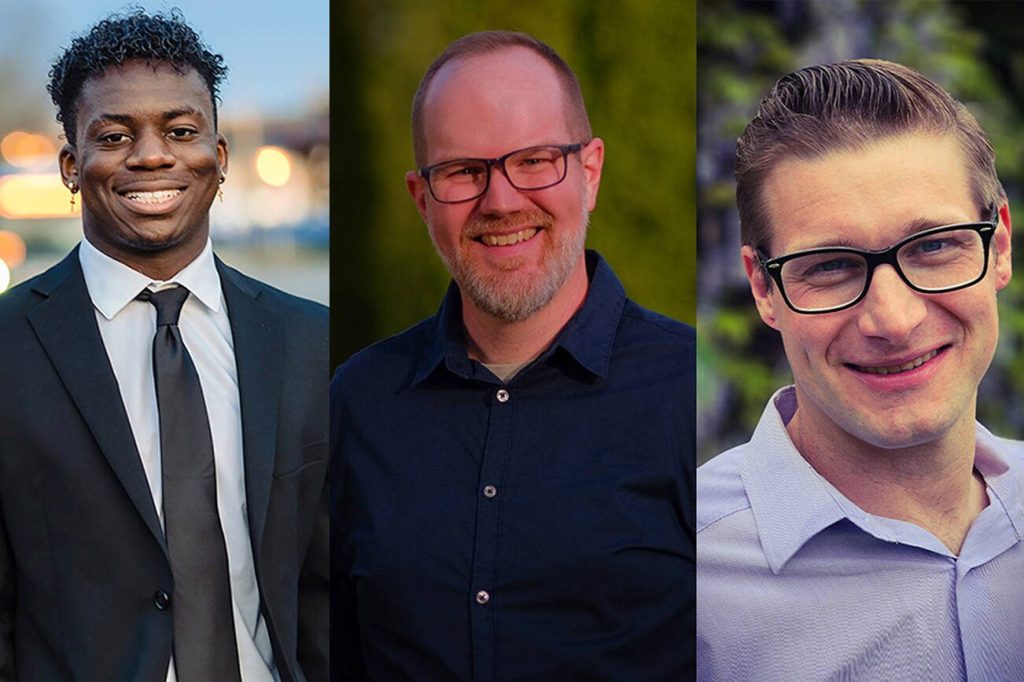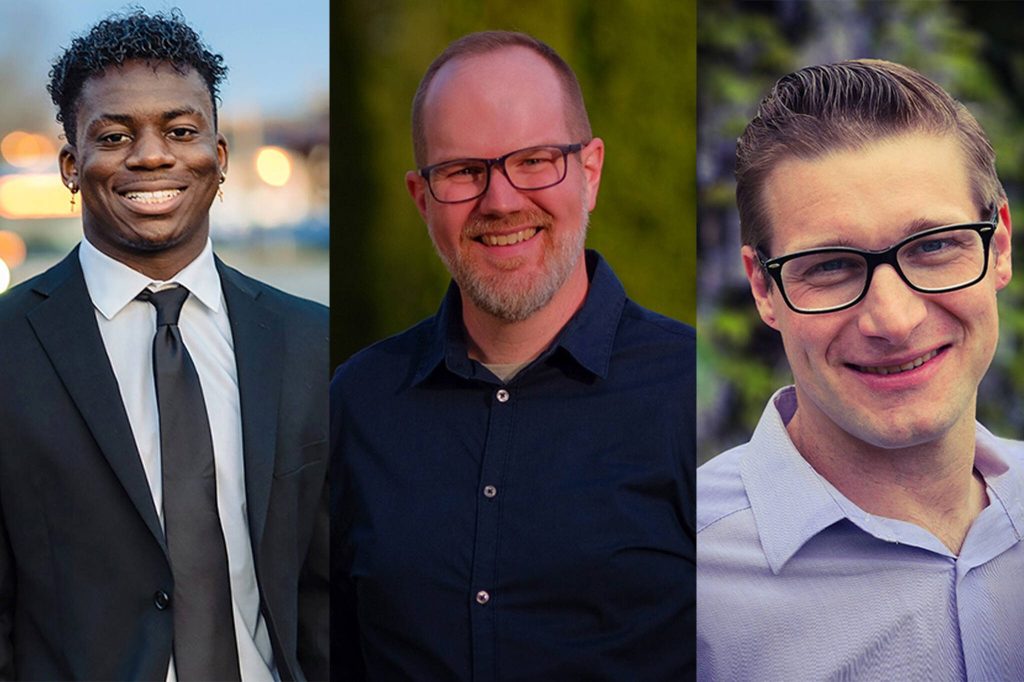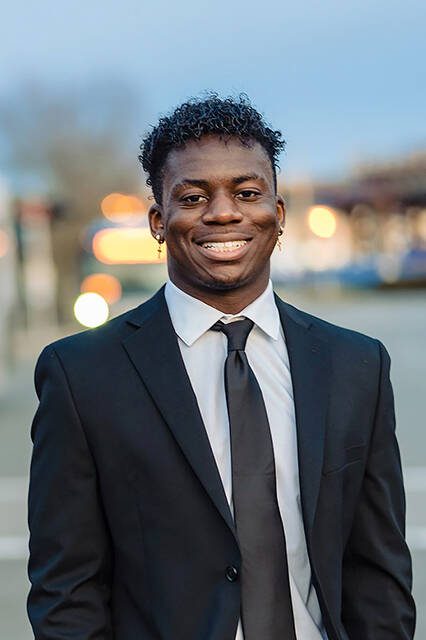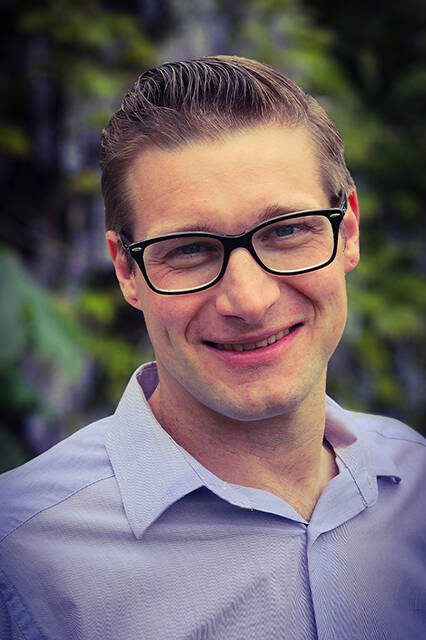Position 3 candidates focus on affordability amid city’s growth
Published 1:30 am Friday, July 18, 2025





EVERETT — Two political newcomers are looking to unseat the Lynnwood City Council vice president as he seeks a second term.
Vice President Josh Binda faces law school graduate Tyler Hall and carpenter Bryce Owings in a primary race for Position 3 on the council.
Binda has held Position 3 since 2022. He replaced former council member Ruth Ross, who served on the council for nearly 20 years.
As of Thursday, Owings had raised the most for his campaign with $2,598. Binda has raised $1,606. Hall has not reported any contributions for his campaign. He filed as a mini reporting campaign, which means he does not have to report expenditures or contributions unless they exceed $7,000. Lynnwood City Council members currently make about $1,650 per month.
The seat is one of four in Lynnwood up for election this year and one of two that will be on the primary ballot.
The primary election is Aug. 5. The top two candidates will advance to the November general election.
Josh Binda
Binda, 25, has served on the council since 2022 when he became the youngest-ever African American elected in Washington. He also runs his own public speaking business. He said his priorities for his next term would be moving Lynnwood forward in affordability, safety and opportunity.
“There’s a lot of things that I’m running back on to continue doing the incredible work that we’ve been doing to build a city that has the vision we envision for the future,” he said.
Lynnwood is planning for anticipated growth from the city’s light rail station, which opened in August 2024. Since the city is in a “high-growth phase,” Binda said it’s important to keep Lynnwood affordable for its residents. He would work to build more affordable housing and improve public transit resources, he said.
“Everyone deserves to have a safe home, healthy food and access to care when they’re sick, and I really have been focused on lowering costs and making sure families have what they need to live well and thrive,” he said.
In his time on council, he’s voted for $400,000 in funding for the Lynnwood Food Bank, allocating COVID-relief funding for the Kids in Transition child care program and supported fair wages for small businesses and unions. In 2023, he testified in favor of state legislation to support students experiencing homelessness.
“I’ve been a strong voice for working-class people and for our community, in terms of making sure that they had a voice that represents them,” he said. “Most of my decisions, whether they’ve been popular or unpopular, have been on behalf of the community.”
Binda’s approach on public safety is “prevention, education and being prepared,” he said, instead of reacting after things happen. He supports investing in mental health support and wellness programs, especially for young people, and taking care of community spaces.
“When we make sure Lynnwood has strong prevention, helpful resources and safe spaces for everyone, I think we help reduce harm and help our city grow into a place where all people can get well and thrive,” he said.
As a council member, Binda supported $1 million in funding for the Lynnwood Neighborhood Center, mental health support staff for Edmonds School District and the Lynnwood Police Department’s gun buyback program, he said.
He also wants to ensure economic opportunity is available for Lynnwood residents, regardless of their income.
“We need an economy where workers are valued, small businesses thrive and everyone has more of a chance to succeed,” he said.
He highlighted his work with council member Derica Escamilla in moving forward the city’s first-ever youth council, which the pair hopes to launch in the fall. In Binda’s public speaking work, he’s spoken to more than 40,000 local students, he said.
“These conversations with our young people, whether that’s local colleges, high schools, middle schools or elementary schools, have been catered toward making sure we’re building up the next generation and giving them the opportunity to see what opportunities are out there for them,” he said.
Binda is endorsed by 39 current and former elected officials, including State Sen. Marko Liias, State Rep. Strom Peterson, Snohomish County Council member Megan Dunn, Mountlake Terrace Mayor Kyoko Matsumoto Wright, Lynnwood City Council member Derica Escamilla, Mountlake Terrace City Council member Steve Woodard and Edmonds City Council members Chris Eck and Susan Paine. He also has endorsements from Snohomish County Democrats, 21st Legislative District Democrats, Snohomish County Indivisible and Washington State Progressive Caucus, among other organizations.
Tyler Hall
Hall, 37, has lived in Lynnwood since 2019. He’s worked in several different industries, from food service to engineering and nonprofits to tech giants. In 2021, he decided to leave his job and pursue a career in public service. In March, he graduated from the University of Washington School of Law.
In law school, he focused on climate adaptation, which he said is largely a municipal issue, inspiring him to run for local office.
“It’s something that’s spoken about on the peripheries of the City Council, but it’s not really been a focus, from what I can tell,” he said.
Hall’s environmental priorities include lowering city utility carbon emissions and embracing different modes of transportation.
“So having really attractive options for bike and pedestrian transit, so it’s not something where there’s any sort of stigma attached,” he said.
He’d also work to create mitigation plans for climate-related emergencies, especially as federal disaster relief funding is uncertain. In June, the Federal Emergency Management Agency denied the state’s request for federal funding to cover damage from the November bomb cyclone.
To address Lynnwood’s growth, Hall supports creating an urban center near the light rail station to foster community.
“There are some people on the council and some candidates for council that want to hold onto what Lynnwood has always been, kind of a sprawling suburb,” he said. “I think there are parts of the city that usually could stay in that form, but we need to seriously consider densification that’s coming with light rail.”
With state and federal funding uncertainty, Hall said the city should look at creative solutions for funding sources and shift the burden to be on those with more resources, including corporations, instead of working people. If elected, he said he would prioritize growth for individuals and working families over trying to get corporate, for-profit entities to come to Lynnwood.
“We can’t keep trying the same thing over and over again and expecting different results when it comes to how we’re funding things,” he said. “It really does take the time to take a look at the laws and see what we can really do to shore up our funding stream.”
Being a city council member requires a balance between representing and legislation, Hall said. He said current council members have focused too much on representing.
“There’s a lot of time spent on things that aren’t really germane to the city and aren’t solving real problems that are in front of the city, and it feels more like different people campaigning throughout the year,” he said.
The City Council could also do more to emphasize the importance of due process amid federal uncertainty, Hall said.
“Almost every candidate will talk about how they want to have safe neighborhoods, and I agree with that, and I think that’s a critical thing of every city,” he said. “But I think for a lot of people to feel safe and for a city as diverse as Lynnwood, the city needs to stand behind the rights of the people that live in the city.”
Hall is endorsed by Moms Demand Action.
Bryce Owings
Owings, 39, is a lifelong Lynnwood resident. He works as an instructor for Edmonds College’s Construction Pre-Apprenticeship Program and serves as treasurer for the local carpenters union.
As Lynnwood grows its infrastructure, Owings said the city should focus on zoning properly and creating housing that’s affordable for both renters and owners, including condos and townhouses.
“We need to do it the correct way, and maybe not just be focused on fixing problems right now and kicking it down the road,” he said.
As a carpenter, Owings helped build the Lynnwood light rail station. Although he sees light rail coming to Lynnwood is a “net win,” he said it has brought more homelessness and drug addiction to the city. When Owings was younger, he personally experienced homelessness and drug addiction, he said. He supports working with police, expanding sanitary stations and temporary housing, and working with trade unions to provide jobs for people after they’ve transitioned into stable housing.
“We need to focus on a humane way to deal with those problems because these are human beings, and we need to make sure that we’re treating them accordingly,” he said. “I know that not everything that worked for me will work for everybody else, but I really have a heart for these people.”
He also supports connecting young people with trade unions to help address teen violence.
“I think a lot of that stems from, maybe they don’t think that there is a future, maybe they think that if they’re not able to go to college, there’s nothing,” he said. “It’s not going to fix the problem completely, but just one route, I think, would be giving these children some hope.”
He would prioritize bringing higher-paying jobs to Lynnwood, with an emphasis on local labor.
“One of the biggest revenue generators in Lynnwood is sales tax, and I think if we can get that money in the hands of the people that live here, that’s going to trickle up to the businesses around here. We should try to keep some of that money here, instead of having outside labor come and do the work in Lynnwood.”
Focusing on local sales tax revenue could prevent needing to quickly raise property taxes, Owings said. In December 2024, the City Council passed a 52% property tax increase as part of its 2025-26, raising property taxes by $12 per month for the average property owner.
“At the end of the day, we do need money to go around,” he said. “I just wish that we planned it out a little more where we could raise it a little bit over time.”
Owings said the current City Council has been doing good work, but may not have the complete trust of the community.
“When I’m voted into office, I want to make a point of being completely open book, allowing people to get ahold of me at any point in time,” he said.
Owings is endorsed by nine current and former elected officials, including State Sen. John Lovick, State Rep. Lauren Davis and former City Council member Julieta Altamirano Crosby. He also has endorsements from the local elevator constructors and ironworkers unions.
Jenna Peterson: 425-339-3486; jenna.peterson@heraldnet.com; X: @jennarpetersonn.









